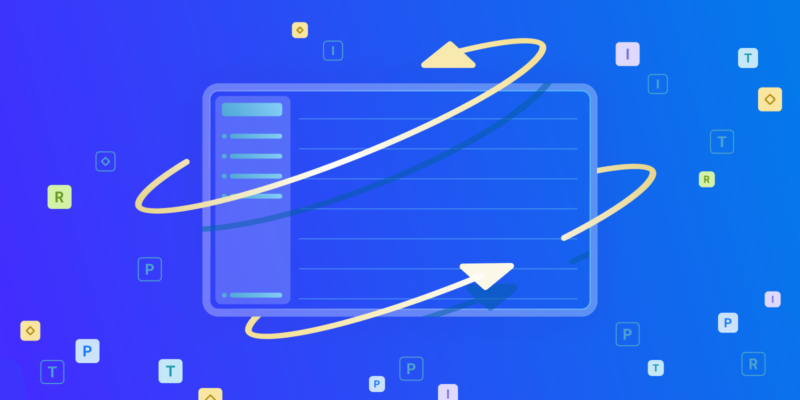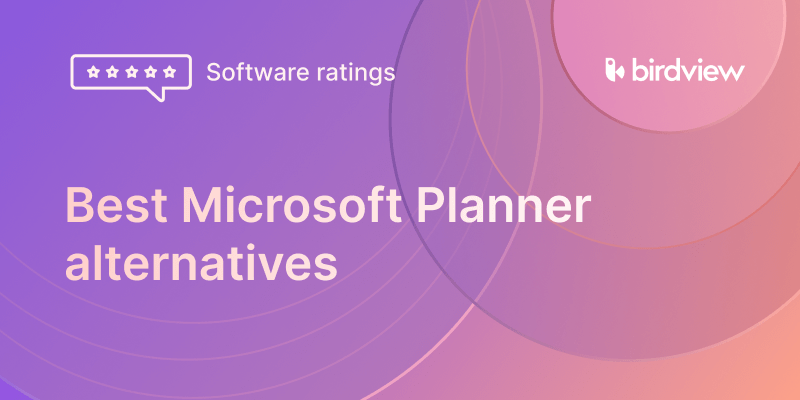Time tracking is a powerful tool that helps ensure accuracy in billing and invoicing, provides insights into productivity, and identifies opportunities for improvement. Whether you’re new to time tracking or looking to optimize your current processes, this guide will explore the fundamentals of project time tracking for consultants and professional services and demonstrate how Birdview can be used to optimize your project management processes.
Why time tracking is important
Before we get to the actual project time-tracking feature, let‘s figure out why it is so important. Time tracking is more than just a method for recording hours worked; it’s a fundamental practice that underpins the success and efficiency of any project. By systematically tracking time, you gain a wealth of data that can transform how you manage projects, allocate resources, and bill clients. Accurate project time tracking for consultants and professional services:
- Ensures that all billable hours are accounted for, leading to precise client invoices and reducing disputes over time charges.
- Provides a clear picture of how much time has been spent on various tasks and projects, helping you keep projects on track and identify productivity trends and areas where improvements can be made.
- Helps in understanding workload distribution, making it easier to allocate resources efficiently and avoid overburdening team members.
- Tracks project costs by monitoring the time spent on tasks, which is crucial for budgeting and financial planning.
- Builds trust with clients by providing detailed time logs and reports that justify billing and show how time was spent on their projects.
- Aids in evaluating employee performance by analyzing time spent on various tasks, leading to more informed feedback and development plans.
- Empowers managers with data to make informed decisions about project timelines, staffing needs, and process improvements.
- Helps distinguish between billable and non-billable hours, aiding in the analysis of project profitability and the identification of cost-saving opportunities.
Read more:
Time tracking options
Every other tool offers a variety of time tracking options designed to fit seamlessly into your workflow. Whether you need to track time for individual tasks, projects, or entire teams, a good time tracking tool should provide flexible and intuitive tools to help you capture every minute. Let‘s explore the different ways you can track time using Birdview, ensuring that you choose the method that best suits your needs.
Page with all your tasks
The “My Assignments” page in Birdview is a great starting point for tracking user‘s time. Here, you can see all your assigned tasks in one place. To track time, the user simply selects the task he‘s working on and starts the timer. This method keeps time entries organized and directly linked to specific assignments.
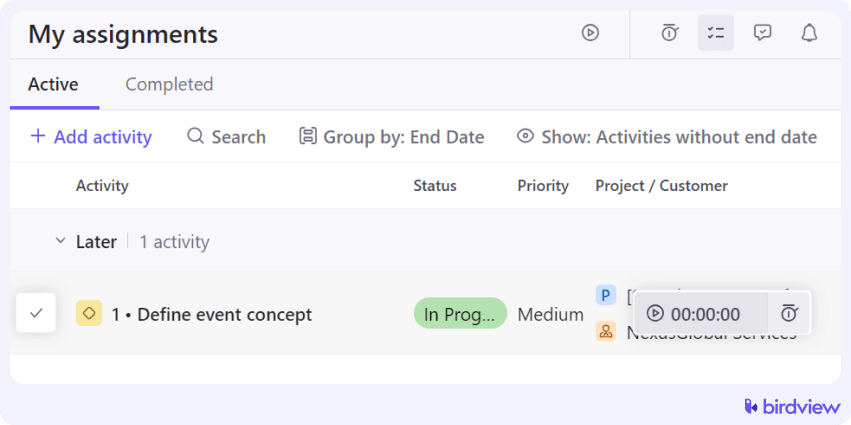
Timer from the Activity Details
This option allows you to start and stop the timer directly from within an activity’s details. Navigate to the activity, click on the timer icon, and Birdview will record the time for you. This level of detail is beneficial for understanding how much time is devoted to specific parts of a project.
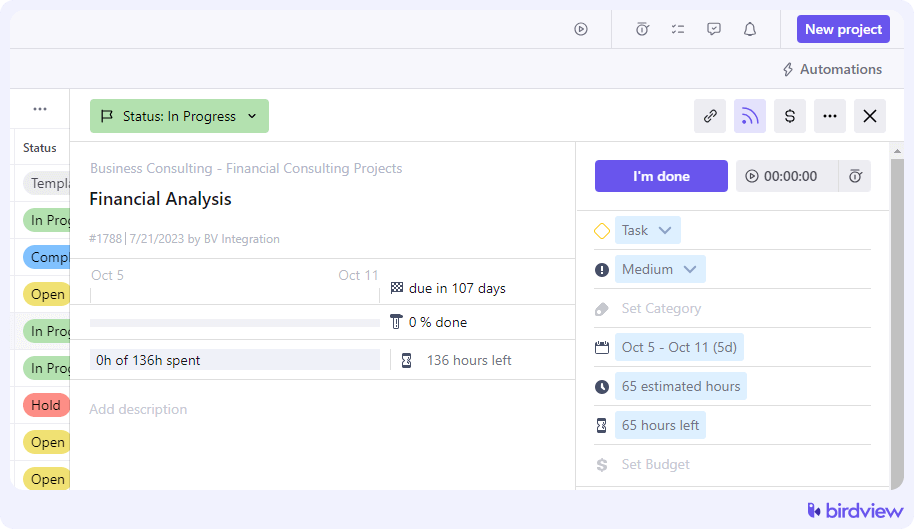
The platform header
A super comfortable way of tracking time is when you can track it from any page! Birdview also offers a global timer in the platform header, making it easy to start and stop tracking no matter where you are on the platform. This timer is perfect for those moments when you switch between tasks frequently. Plus, the active timer is visible on the browser tab, so you always know if the timer is running, even if you’re multitasking or working across different applications.
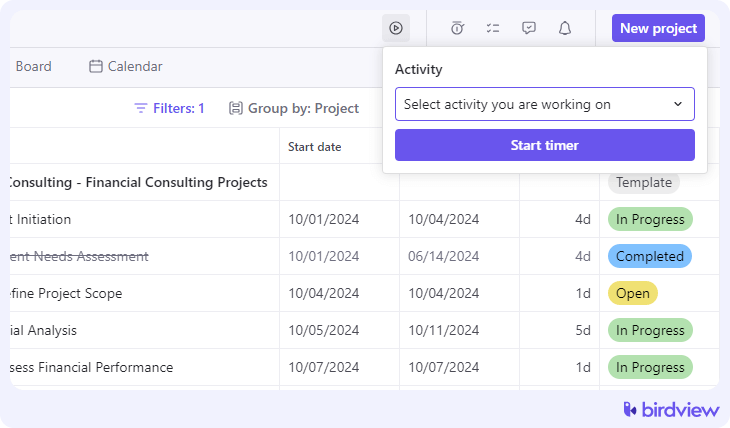
Use of project time tracking in professional services industries
Project time tracking can be applied across various professional services industries. Let’s look at specific examples of how time tracking can be used in consulting, marketing agencies, IT services, and legal services.
Business Consulting
In business consulting, tracking billable hours accurately is crucial. With Birdview time tracking for consultants, you can monitor the time spent on client projects down to the minute. Generate reports to review with clients during meetings, ensuring transparency and trust.
Example: Track the hours spent on preparing for and conducting strategy sessions with clients. For instance, if you have a two-hour meeting with a client to discuss their marketing strategy, start the timer as soon as the meeting preparation begins and stop it when the session ends.
Marketing Agencies
Marketing agencies juggle multiple campaigns simultaneously. Birdview helps manage time effectively across various projects, providing insights into how much time each campaign consumes. Use this data to analyze campaign performance and optimize future efforts.
Example: Track the time spent on brainstorming and planning marketing campaigns. If your team spends three hours in a brainstorming session for a new social media campaign, start and stop the timer accordingly.
IT Services
For IT services, time tracking is essential for managing development and support tasks. Birdview enables you to keep detailed logs of time spent on different activities, helping project managers oversee progress and allocate resources efficiently.
Example: Track the hours spent on coding, debugging, and testing new software features. For example, if a developer spends ten hours over a week working on a new feature for a client‘s application, use Birdview to log these hours.
Legal Services
In legal services, precise time tracking for casework is paramount. Birdview ensures all billable hours are recorded accurately, supporting detailed and transparent client billing. Accurate time logs are essential for maintaining client trust and ensuring fair billing practices.
Example: Monitor the hours spent in consultations with clients. For instance, if you have a one-hour consultation with a client to discuss their case, start and stop the timer for accurate billing.
How project time tracking affects your business profitability
Time tracking has a direct impact on the profitability of your projects and business. By accurately recording and analyzing how time is spent, you can make informed decisions that boost revenue, control costs, and enhance overall financial performance. Let‘s explore how effective time tracking influences profitability through better management of billable and non-billable hours.
Billable hours: a method to boost your revenue
Billable hours are the cornerstone of revenue generation for many businesses, especially in professional services. These are the hours you can directly charge to clients for the work performed on their projects. Accurate tracking of billable hours is crucial for several reasons:
- Revenue generation: Ensures that all the work done for clients is accounted for, preventing revenue leakage.
- Transparent invoicing: Provides detailed and accurate invoices, reducing disputes and enhancing client trust.
- Project profitability: Helps in assessing the profitability of projects by comparing the revenue generated from billable hours against the costs incurred.
- Performance metrics: Enables the evaluation of employee productivity based on the billable hours they contribute.
With Birdview, logging billable hours is straightforward. You can link each time entry to specific tasks and projects, ensuring that all billable work is accurately captured and documented. This precision not only aids in creating clear and comprehensive invoices but also supports detailed project analysis and financial reporting.
Non-billable hours: managing unseen costs
Non-billable hours refer to the time spent on activities that do not directly generate revenue. In the professional services field, these include administrative tasks, internal meetings, training, and other non-client related activities. While these hours are not charged to clients, they are still important to track for several reasons:
- Cost management: Helps in understanding the true cost of running a business by accounting for all time spent.
- Productivity analysis: Identifies how much time is spent on non-billable activities, highlighting areas where efficiency can be improved.
- Resource allocation: Ensures that team members are not overburdened with non-billable tasks, allowing more focus on billable work.
- Process improvement: Provides insights into where processes can be streamlined to reduce non-billable time.
Birdview makes it easy to monitor non-billable hours. By tracking these activities, you can identify opportunities to minimize non-billable work and potentially convert some of these hours into billable ones. Efficiently managing non-billable time helps boost overall productivity and profitability, ensuring that your team focuses more on client-related tasks.
Integrating project data with your accounting systems streamlines the billing and invoicing process. Detailed time logs ensure accurate invoices, reducing disputes and enhancing client satisfaction.
Project time tracking reports
Time tracking is worthless if it is not analyzed. Birdview makes generating time-tracking reports simple and customizable, providing you with the insights needed to make informed decisions. These reports can be tailored to meet various needs, such as project management, client billing, and team performance evaluation. Here are some examples of the types of project reports you can generate in Birdview and their descriptions:
Time Log Report
The Time Log Report for a specific project provides a comprehensive record of all time entries related to that project. It includes details such as the date and duration of each time entry, the task or activity associated with the time entry, and the team member who logged the time.
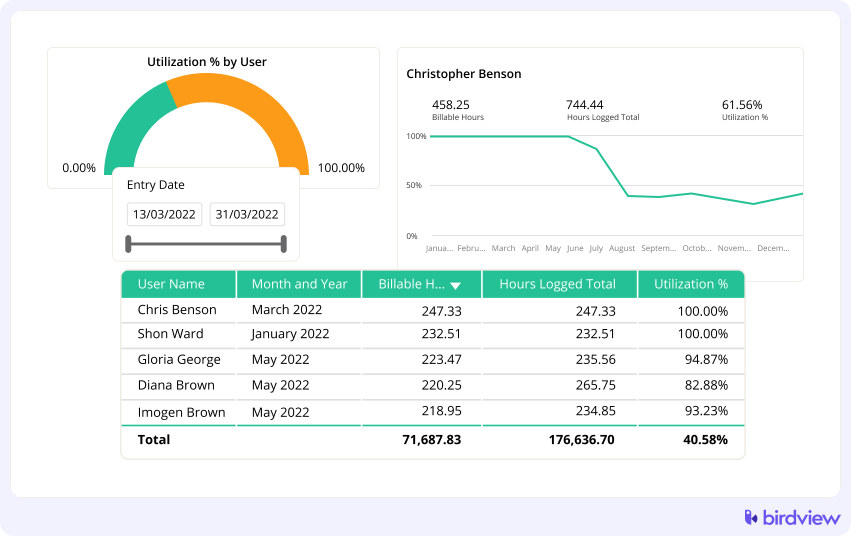
Project Duration Report
Project Duration Reports summarize the total time spent from the start to the end of a project. This report helps in assessing how long a project took compared to initial estimates and planned schedules.
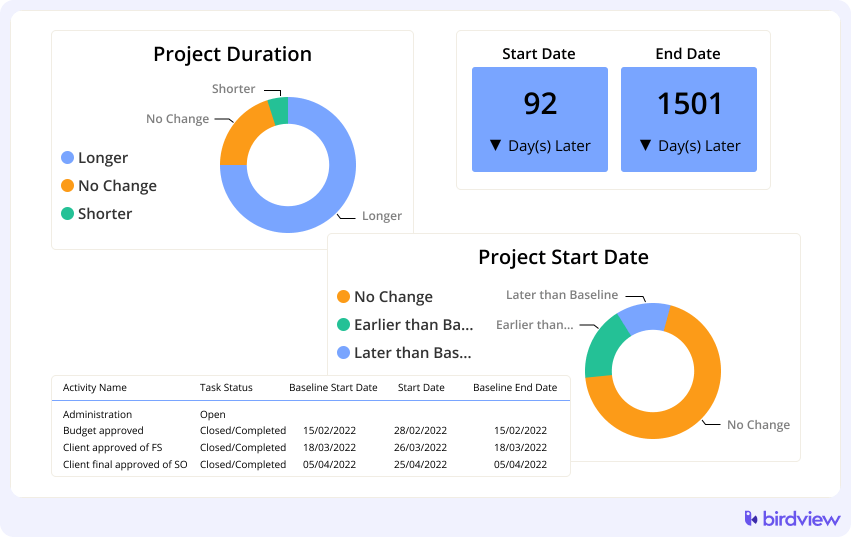
Schedule Performance Report
The Schedule Performance Report analyzes how the project is progressing relative to the planned schedule. It usually shows how many activities were completed on schedule within the chosen period.
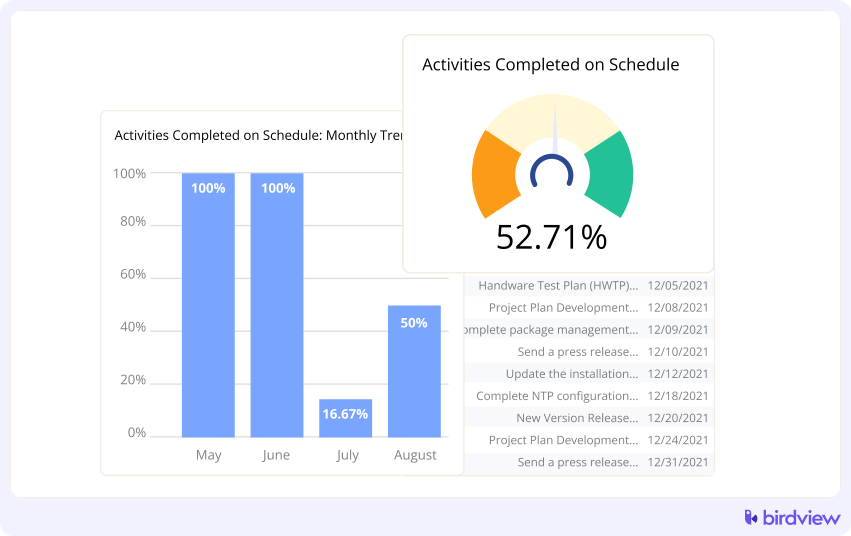
Resource Loading Report
The Resource Loading Report shows how work is distributed across team members, highlighting resource utilization and identifying potential overloading or underutilization.
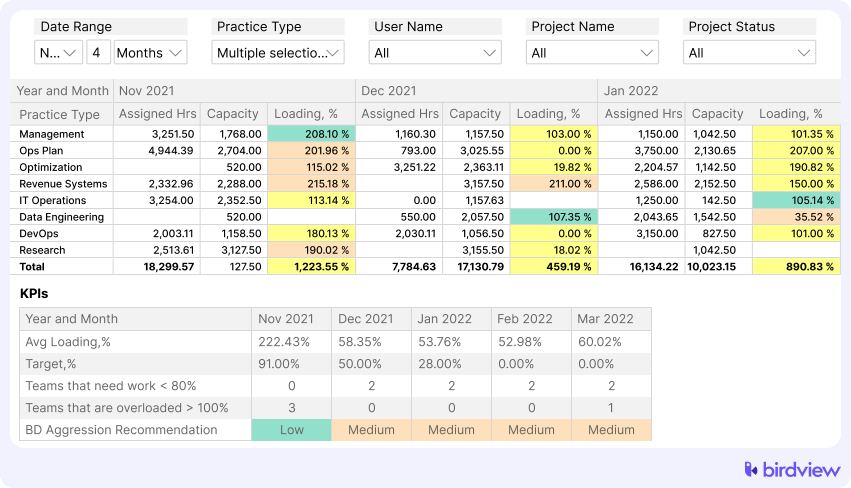
Hours Logged Overview
The Hours Logged Overview provides a summary of all hours logged across multiple projects within a specified time frame. This report helps to understand overall time distribution and workload.
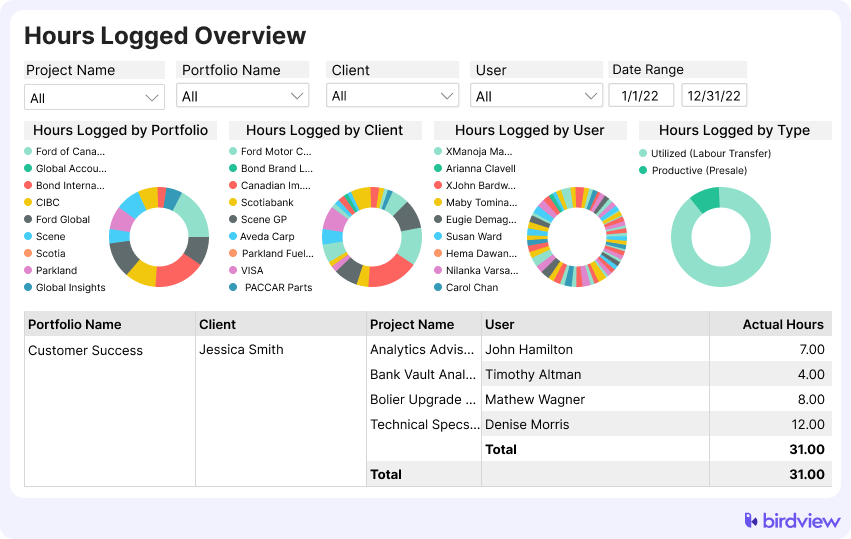
Estimated vs. Actual Hours
The Estimated vs Actual Hours Report compares the initially estimated hours for tasks or projects against the actual hours logged. This report helps in assessing accuracy in project planning and identifying areas for improvement.
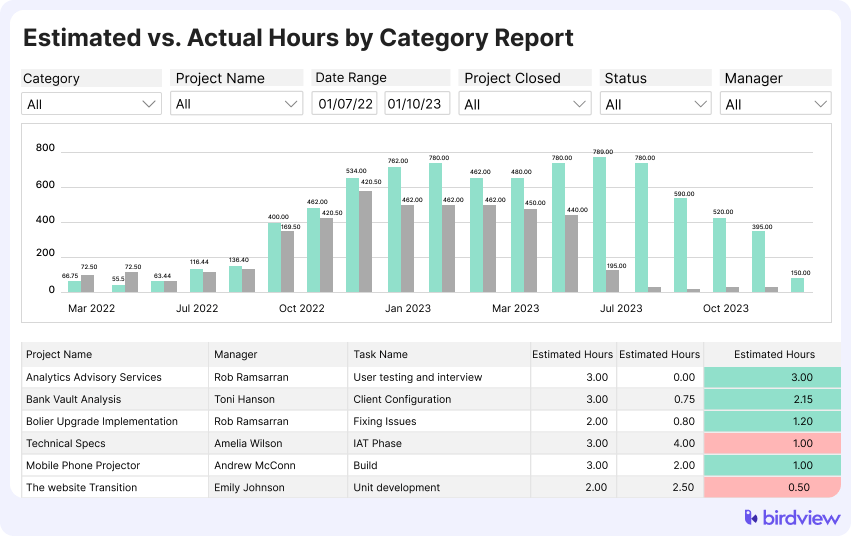
Payroll Report
The Payroll Report calculates the payable amount for each team member based on their logged hours and the corresponding pay rates. This report is essential for accurate payroll processing.
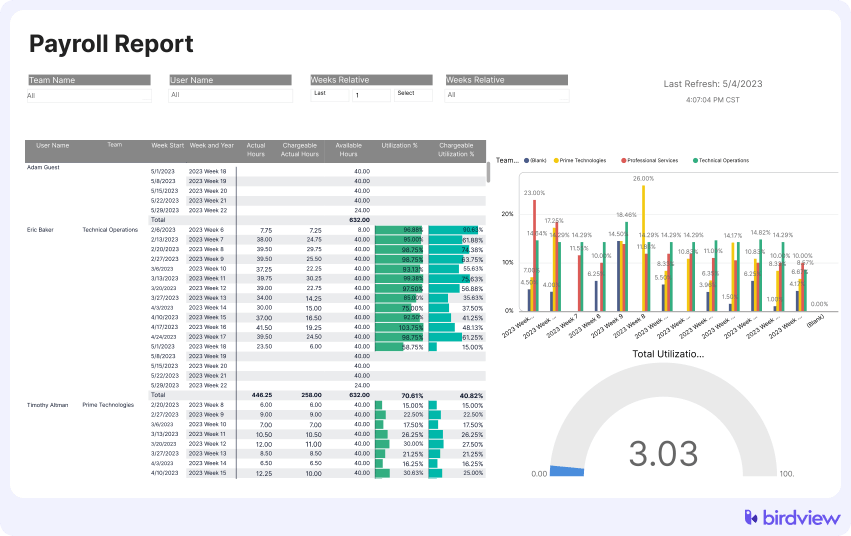
How project time tracking affects team efficiency
Effective project time tracking for consultants and professional services significantly impacts team efficiency, providing insights that help optimize performance and productivity. Here are only a few ways in which time tracking can enhance team efficiency:
- Real-time insights into team performance
By continuously monitoring real-time data on how team members are spending their work hours, managers can gain valuable insights into productivity trends, allowing them to identify which tasks or projects are taking longer than expected and why.
- Identification and addressing of bottlenecks
By analyzing time logs, managers can identify specific tasks or stages in a project where team members are spending excessive time. Once these bottlenecks are identified, steps can be taken to streamline processes, provide additional training, or reallocate resources to eliminate the delays.
- Enhanced resource allocation
Accurate time tracking ensures that no team member is overburdened while others are underutilized. By balancing workloads effectively, managers can prevent burnout and ensure that all team members are working at optimal capacity.
- Improved task management
Time tracking allows teams to break down larger projects into smaller, manageable tasks with specific time allocations. This granularity helps in better planning and execution of tasks, as team members have a clear understanding of how much time they should spend on each activity.
- Accountability and motivation
When team members know that their time is being tracked, it naturally increases accountability. This awareness can lead to higher levels of motivation and productivity, as employees strive to manage their time effectively and meet their targets.
- Enhanced communication and collaboration
With clear time tracking records, team members can communicate more effectively about their progress and any challenges they are facing. This transparency fosters better collaboration, as everyone is aware of what their colleagues are working on and how their tasks interconnect.
Read more:
- Continuous improvement
Time tracking is not just about monitoring current performance; it’s also a tool for continuous improvement. By regularly reviewing time tracking reports, teams can identify areas where processes can be optimized, skills can be enhanced, and efficiencies can be gained.
Final thoughts
Project time tracking for consultants and professional services is essential for ensuring accuracy in billing, gaining insights into productivity, and identifying areas for improvement. We hope this article helped you to understand the fundamentals of project time tracking and how implementing a robust system like Birdview can significantly enhance your project management capabilities.
Sign up for a free trial today or schedule a demo call to see how Birdview‘s project time tracking capabilities can transform your project management processes. Experience firsthand the benefits of precise time tracking and empower your team to achieve more.

